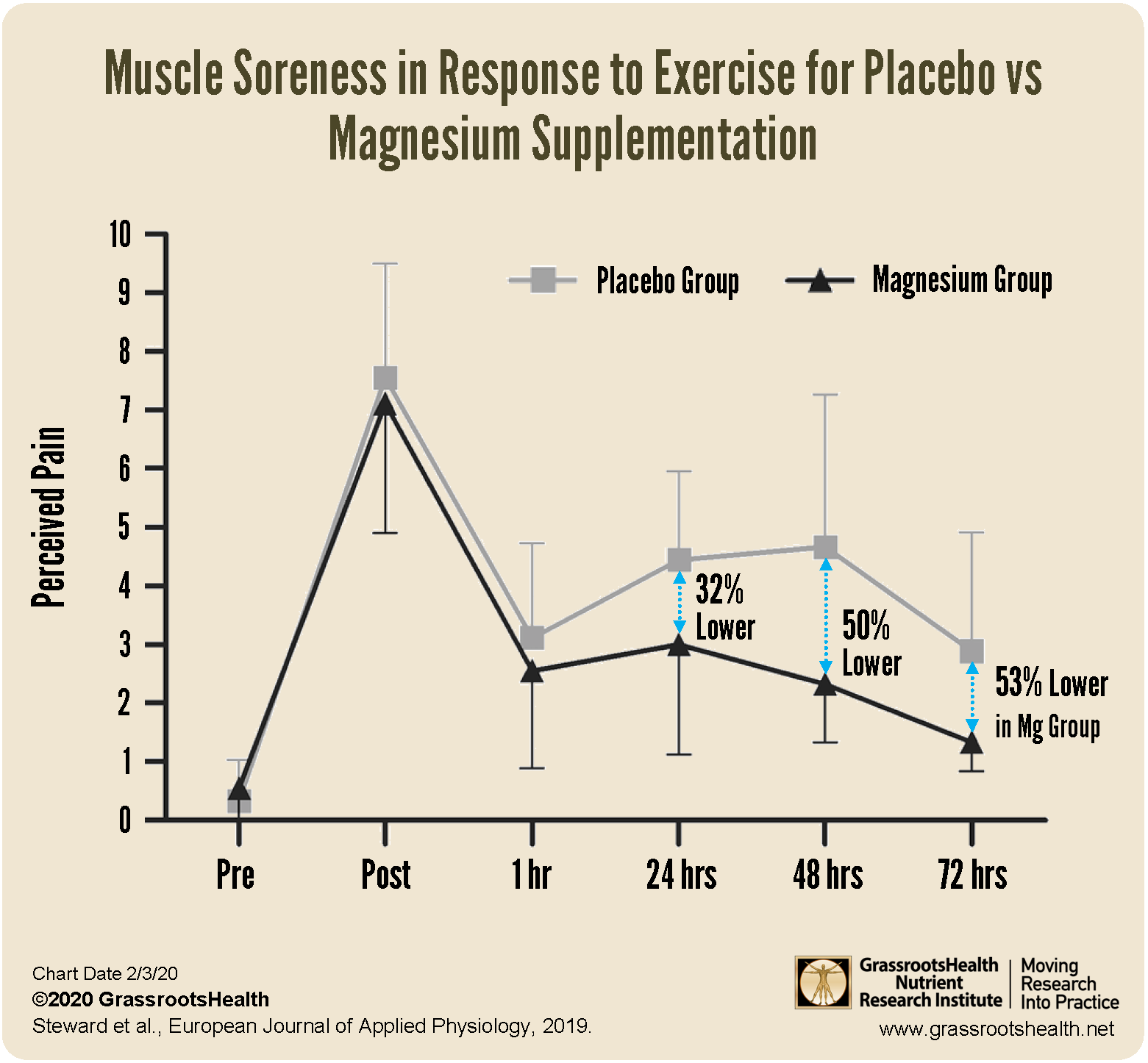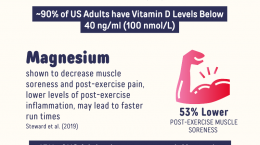Published on February 5, 2020
Muscle soreness and pain are commonly seen among people who exercise. Could the nutrients we receive on a day-to-day basis help decrease this unwanted side effect? Previous posts have highlighted the benefits of vitamin D and omega-3s for athletic performance and exercise recovery. What about magnesium, which is essential to muscle function and health?
The authors of the study mentioned below recognized that most people do not get an adequate amount of magnesium in their diets, and decided to take a look at how magnesium supplementation might affect post-exercise muscle soreness.
How did the study work?
 A double-blind, placebo-controlled, cross over study recently published by Steward et al. included data from 9 male recreational runners who were put on a low-magnesium diet, and were either given a week of 500 mg/day of magnesium or a placebo prior to a 10 km downhill run. Measurements for muscle soreness (using a pain scale of 0 to 10) were taken prior to the run, and at 1 hour, 24 hours, 48 hours and 72 hours after. Additional testing included blood levels of interleukin-6 (IL-6), soluble interleukin-6 receptor (sIL-6R), creatine kinase (CK), glucose and lactate. The process was repeated for all participants with the opposite treatment after a two week wash-out period (those who received placebo prior to the first run received the magnesium supplement prior to the second run, and visa versa).
A double-blind, placebo-controlled, cross over study recently published by Steward et al. included data from 9 male recreational runners who were put on a low-magnesium diet, and were either given a week of 500 mg/day of magnesium or a placebo prior to a 10 km downhill run. Measurements for muscle soreness (using a pain scale of 0 to 10) were taken prior to the run, and at 1 hour, 24 hours, 48 hours and 72 hours after. Additional testing included blood levels of interleukin-6 (IL-6), soluble interleukin-6 receptor (sIL-6R), creatine kinase (CK), glucose and lactate. The process was repeated for all participants with the opposite treatment after a two week wash-out period (those who received placebo prior to the first run received the magnesium supplement prior to the second run, and visa versa).
What did the study find?
There were several benefits seen among the groups receiving magnesium supplementation compared to those receiving placebo. As can be seen in the chart below, muscle soreness (measured as perceived pain) was significantly higher at all three time points from 24 hours to 72 hours after completing the run in the placebo group compared to the magnesium group. Measurements for IL-6 and sIL-6R, which can be used to assess the level of inflammation and fatigue, went up after the run for both groups, but remained significantly lower in the magnesium group after running compared to placebo. While there was not a significant difference in the overall average speed, seven of the nine participants did complete the run with a faster time after taking the magnesium supplements compared to when they received the placebo.
As can be concluded, nutrients such as magnesium, vitamin D, and omega-3s may be beneficial for optimal exercise performance and recovery. Testing your levels of these nutrients is the best way to be sure you are getting enough – all three of these can be measured with the Magnesium*PLUS test kit.
Make Sure You Are Getting Enough Vitamin D and Other Important Nutrients
Measuring your vitamin D level and calculating a supplementation amount to help reach and maintain a target level, or taking loading doses to correct deficiency faster, could possibly make all the difference in overall health, wellbeing, and how a current disease situation progresses. Test your level now!
Create your custom home blood spot kit by adding any of the following measurements, along with your vitamin D:
- Omega-3 Index (with or without Ratios AA:EPA and Omega-6:Omega-3)
- Magnesium (with or without additional Elements – copper, zinc, selenium, mercury, cadmium, lead)
- hsCRP as a marker of inflammation and HbA1c as a marker of blood sugar health
Having and maintaining healthy vitamin D levels and other nutrient levels can help improve your health, now and for the future. Enroll and test your levels today, learn what steps to take to improve your status of vitamin D (see below) and other nutrients and blood markers, and take action! By enrolling in the GrassrootsHealth projects, you are not only contributing valuable information to everyone, you are also gaining knowledge about how you could improve your own health through measuring and tracking your nutrient status, and educating yourself on how to improve it.
How can I track my nutrient intake and levels over time?
To help you track your supplement use and nutrient levels, GrassrootsHealth has created an online personal health tracking system called myData-myAnswers. For each specific supplement, you can track what days you take it, how much, and many other details. This will help you know your true supplemental intake and what patterns of use work for you to reach and maintain optimum nutrient levels. Check it out today!







